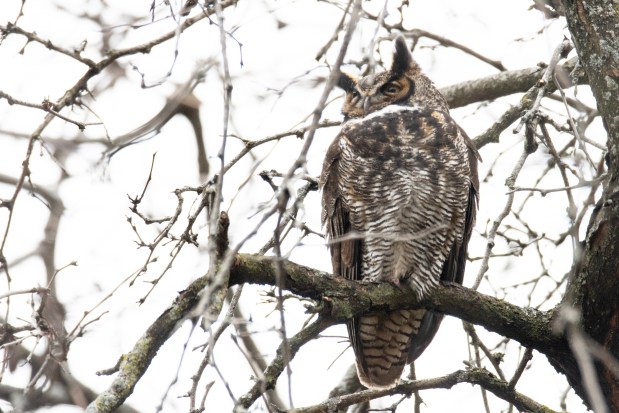After a small family of owls made Lincoln Park’s North Pond their home this spring, Chicago residents flocked to the area to try to catch a glimpse of the two great horned owls raising their young.
But, the father of the family, an adult male owl, was found unresponsive by the Chicago Bird Collision Monitors midday Wednesday. According to Annette Prince, executive director of the organization, the horned owl died shortly after being rescued.
The group suspects the male owl consumed a rat tainted by rat poison.
“They lived in a tree facing Cannon Drive,” Prince said. “The father would hunt for the family, and the mom would stay with the young. People have told me they saw him feeding on things like rats and mice.”
The owl was found vomiting blood, which is often a sign of rat poison, according to Prince. She said the only other option that could cause that kind of internal bleeding is blunt force trauma, which seems unlikely since the owl appeared externally unharmed.
Prince added that rat poison is common in birds rescued by her organization in Chicago.
“We see this often with many of the hawks that we rescue in Chicago,” Prince said. “They will prey on mice and rats that have gotten doses of poison. Many of us bird groups have been talking about ways to get municipalities to look for non-toxic alternatives to control rats and mice.”
The owl was sent to the Willowbrook Wildlife Center to determine a cause of death, according to Prince. A representative from the Willowbrook center said vets were unable to confirm the owl’s cause of death, though there was some evidence to suggest rodent poisoning had contributed.
Almost 4 million great horned owls can be found in a variety of habitats across North America, including in Illinois. The second-heaviest owl species in America after snowy owls, great horned owls are known for their hunting skills, big yellow eyes, deep hoots and the feather tufts on their heads. They nest as early as January, since their owlets need more time than other young birds to learn to hunt on their own ahead of the next winter.
Red crossbills, bald eagles and other unexpected birds have been spotted in Chicago this winter
Holly Fales Garvey is a volunteer environmental educator and a raptor specialist based in Antioch. She said she sees a lot of raptors and eagles injured or killed by rodent poison.
Garvey said rodent poison can travel up the food chain, affecting far more than just rodents and birds. Animals as big as coyotes and foxes have been affected by the poison, she said.
“Any animals that scavenge or are predatory and are hunting, consuming sick and dying prey, are susceptible to this poison,” she said. “So this is really quite common. We’ve seen it in cats and dogs, and even children have been treated.”
Garvey said there are many alternatives to poison for Chicagoans looking to ward off rodents. Snap traps and electric traps, as well as commercially available contraceptives for rat populations, are all options that are less likely to harm other animals, she said.
Garvey suggested homeowners calling a pet control service request that the service not use rodenticide.
Groups such as the Willowbrook Wildlife Center have been working on solutions to these poisonings, using methods such as blood transfusions to replace the dangerous chemicals in birds’ bloodstreams, according to Prince.
But, Prince added, the end goal is to stop birds from dying from rodent poisoning altogether.
“The primary prey of many birds are these small mammals that people are hoping to kill with rodenticide,” Garvey said. “If we have healthy bird populations, they’re going to do a lot of that work for us. If we allow these birds to do what they need to do, and work in their ecosystems, that is going to do a lot for us.”





